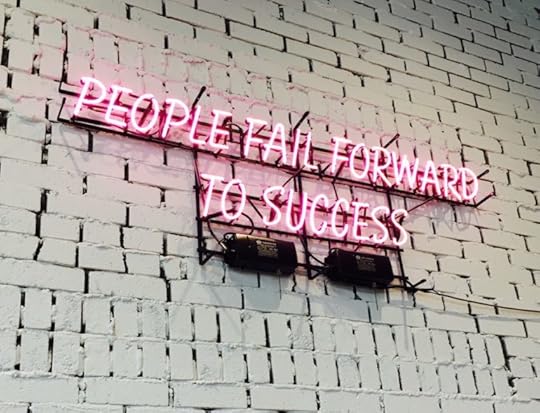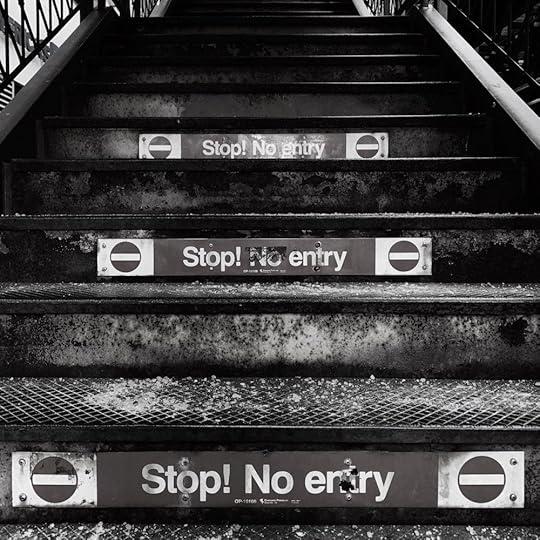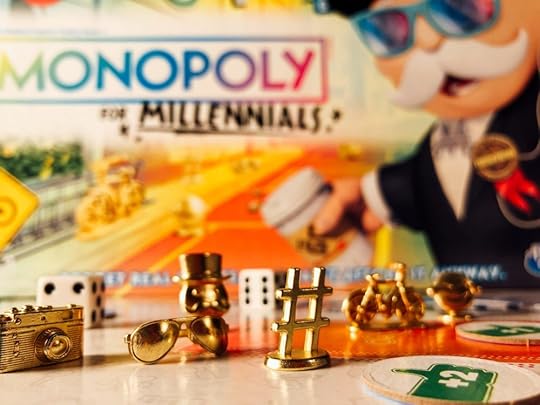Daniel Im's Blog, page 11
January 29, 2019
The Best Leaders Learn From Failure

“An inventor fails 999 times, and if he succeeds once, he’s in. He treats his failures simply as practice shots.”
Those are the words of the famous American inventor, engineer, and businessman who just happens to hold an unimpressive 186 patents—Charles Kettering.
Wow. One hundred eighty six patents!
His patents include the electrical starting motor, leaded gasoline, and the Freon refrigerant that goes in our refrigerators and air conditioning systems. This is some serious inventing he did—unlike those who win the Stupid Patent of the Month award (it’s actually a thing).
Here’s what stood out to me about this quote: Although everyone fails—especially leaders—the best leaders learn from their failures and keep on moving forward.
Although everyone fails—especially leaders—the best leaders learn from their failures and keep on moving forward.
Click To Tweet
Where will your failure take you?
When I visited the Pacific Science Center in Seattle, WA over Christmas, I came across the Wall of Failure. Just as it inspired me to keep on stepping out in faith and trying new projects, I hope it does the same for you.
Here are the names and descriptions of some of the failed leaders on the Wall of Failure who kept on moving forward. This is directly from the exhibit.
J.K. Rowling – failed author
“An unemployed, single mother on welfare whose first children’s book was rejected by all 12 major publishers.”
Albert Einstein – failed genius
“A poor student who didn’t speak until age 4 or read until age 7, Albert was considered “slow” by family and teachers and was eventually expelled from school.”
Einstein couldn’t read until 7.
Click To Tweet
Michael Jordan – failed athlete
“A somewhat promising basketball player who barely met minimum height requirements, Michael Jordan was not allowed to join his high school’s varsity team.”
Michael Jordan was too short to join his high school team.
Click To Tweet
Abraham “Abe” Lincoln – failed politician/president
“A failed businessman who also suffered a nervous breakdown, Abe Lincoln was defeated no less than six times when running for office.”
Emily Dickinson – failed poet
“A prolific but unrecognized poet; fewer than a dozen of Emily Dickinson’s 1,800 poems were published during her lifetime.”
Walter Elias “Walk” Disney – failed animator
“Fired from his job at the Kansas City Star because he “lacked imagination,” Walk Disney went on to found an animation studio called “Laugh-O-Gram Films” which went bankrupt after several years.”
Walk Disney was fired for lacking imagination.
Click To Tweet
Jack Ma – failed businessman
“After flunking preschool and secondary school, Jack Ma was turned down by Harvard 10 times before having his application rejected by over 30 different companies for jobs ranging from fast food work to entry level police positions.”
Oprah Winfrey – failed anchorwoman
“A co-anchor on Baltimore’s WJZ-TV who was fired after seven months because she was too invested in the stories she was covering.”
Oprah was fired as an anchorwoman for being too invested in her stories.
Click To Tweet
Thomas Alva Edison – failed inventor
“Considered “too stupid to learn anything” by his teachers as a youth, Thomas Edison was fired from two jobs as an adult for not being productive enough.”
Your failures don’t define you.
So rather than dwelling on the past, look up and move forward. See your failed attempts as practice shots, and just keep on going.
Who knows how God might use that failure to carve a path forward for you. And perhaps that failure is exactly what God is using to get you ready for your next chapter in life.
Your failures don’t define you.
Click To Tweet

January 8, 2019
Change, Trains, and Leadership
Your church or organization is like a train.
Recently I filmed a 90 Second Leadership video for LifeWay Leadership on this important insight about leadership and change.
I hope you enjoy it!
Click here to watch other 90 Second Leadership videos by LifeWay Leadership.
January 1, 2019
How Do You Disciple, Train, Teach, and Lead Others?
Whatever method you use is likely what was used on you.
Recently I filmed a 90 Second Leadership video for LifeWay Leadership on this important insight that reveals how we best learn.
I hope you enjoy it!
If you like what you saw on this video, I elaborate on this concept further in my book, No Silver Bullets: Five Small Shifts that will Transform Your Ministry.
Click here to watch other 90 Second Leadership videos by LifeWay Leadership.
December 17, 2018
How to Create a Vision Statement For Your Church
 There are no perfect church vision statements.
There are no perfect church vision statements.If you’re looking to change yours, or create one from scratch, the thought of copying another church’s vision statement has probably come across your mind.
Don’t do it!
While it’s fine to see how others have worded theirs for ideas and inspiration—whatever you do—don’t short circuit the process.
Now obviously, copying someone else’s vision statement would be easier and faster, but in this matter specifically, the process is as important as the outcome (I’ll explain why later on). And while the foundation for every church’s vision statement is built with the same building blocks of the Great Commission and the Great Commandment, the way you put them together needs to be different than the way the church down the road did theirs. This is because the vision statement for your church is for your church—it’s not for the church down the road! So your vision statement needs to be contextualized and worded into language that your church understands.
One more note about vision statements, and then I’ll get to why the process is as important as the outcome.
A great vision statement is like the kingdom of God—it’s already, but not yet.
It needs to be feel real and tangible, but not fully here, since vision is more about the future than the present. It’s more like a foretaste, than it is a full meal. Here’s how I describe it in my book, No Silver Bullets.
Vision is about the preferred future. It’s the ability to conceptualize a picture of a golden tomorrow that does not yet exist. It’s about seeing both the difficulties and possibilities so clearly that you can actually visualize a different reality than the one you can see with your eyes. Simply put, vision is about painting the dreams that God has laid on your heart for all to see. In order to discover those God-given dreams, you need to start by considering “everything to be a loss in view of the surpassing value of knowing Christ Jesus my Lord” (Phil. 3:8) so that you can stop wondering “what kind of mission God has for me,” and instead begin asking, “what kind of me God wants for His mission.”
Vision is about the preferred future. It’s the ability to conceptualize a picture of a golden tomorrow that does not yet exist.
Click To Tweet
So how do I create a church vision statement?
You need to start with the understanding that it doesn’t all fall on your shoulders. Your church’s vision statement isn’t something that you need to create out of thin air, or come down from the mountain with.
It already exists—your role as the leader is to mine it out of your people.
And here’s why: God has a unique role for your church in your neighborhood and city. He has brought the people in your church together specifically for a purpose. There is a unique mix of gifts, talents, and callings in your church that doesn’t exist in any other church in the world. So your role as a leader is to discover the way that God is already moving in your midst and then articulate that in a compelling and infectious way through a vision statement.
Your role as a leader is to discover the way that God is already moving in your midst and then articulate that in a compelling and infectious way through a vision statement.
Click To Tweet
But you can’t do this without prayer
I love brainstorming, whiteboarding, and writing on big sheets of paper on the wall. It’s invigorating and incredibly life giving. In fact, you can do a lot of work clarifying what is, in order to determine what can be, via exercises like these.
However, you must not and should not do this without prayer. So that trite little prayer that you do before a full day of vision work does not cut it. You need to soak and saturate the entire process in prayer, since ultimately this is about discovering God’s vision for His church, not crafting your vision for your church.
You need to soak and saturate the entire process in prayer, since ultimately this is about discovering God’s vision for His church, not crafting your vision for your church.
Click To Tweet
So, before you bring out the whiteboards, make sure you set aside time to spend in prayer and in listening to your church.
1. Spend time in prayer
Since God has a vision for His church—that you happen to be stewarding and leading at the moment—don’t you think he’d want to let you in on it? And wouldn’t prayer be the place to find out?
So before you begin whiteboarding your new vision statement, schedule a night of prayer and worship with your leadership team. Begin praying for your church, your neighborhood, your city, and the lost. Read the Scriptures, worship, pray, and spend time with the One who holds and knows the vision for your church!
Make sure that the worship is experiential, since not everyone connects with God in the same way. You can have stations for journaling, others for communion, another one for art and illustrations, and so on.
Be creative! You don’t need to end the night with a written down vision statement—in fact, that’s not the purpose. Instead, you just want to facilitate a time where your leadership team is approaching the throne of God together in worship. You’ll be amazed at the ways that God can and will move.
2. Listen to your church
As you’re praying about the vision for your church, I’d encourage you to preach a sermon series on the early church. This will not only give you an opportunity to study ecclesiology, but it will provide a forum where you can ask your congregation to share their thoughts on the church.
Throughout the weeks that you’re preaching the sermon series, schedule time to meet with a wide range of your members to get their thoughts on the church: men, women, Gen Z, millennials, Gen X, boomers, and people of different ethnicities. In fact, several of your leadership team members should do the same. If everyone takes copious notes, and then someone summarizes them before your next leadership team meeting, there will be patterns that emerge.
After you do all of that, I’d encourage you to go through the Vision Audit that I outline in chapter 7 of my book, No Silver Bullets. Here’s an image of it.
If you work through this vision audit, then do the strategy and values audit, you will be well on your way to crafting and creating a vision statement.
See what I mean when I said earlier that the process is as important as the outcome?
Without starting in prayer, spending time listening, and completing these audits, you will naturally copy another church’s vision statement, and in turn, end up missing the incredible way that God wants to speak to and through you into your community
Don’t short circuit the process.
December 11, 2018
Stop Chasing the Platform

“You’re not big enough, smart enough, wealthy enough, strong enough, funny enough, famous enough…”
Ugh, I want to throw up—and it’s not because these messages seem to be everywhere I look. I want to throw up because they’re all true.
It’s true that others are bigger, smarter, richer, stronger, funnier, and more known than you. And it’s also true that you are bigger, smarter, richer, stronger, funnier, and more known than others. But let’s play this out to the end.
Even if you do reach the top and beat out everyone else around you—whatever that looks like—the clouds will eventually clear, only to uncover the fact that there are even higher mountains to climb. And at what loss or expense will you have done this? Only to realize that the success that you apparently achieved is like vapor or a vanishing mist?
Success is like vapor or a vanishing mist. It’s there, but impossible to grasp.
Click To Tweet
It.never.ends.
And by “it,” I’m referring to this game of comparison that we always seem to be caught up in. The rat race. And this pursuit for contentment in the very things that never seem to satisfy.
Just consider these words from a famous comedian and actor that seemed to have it all,
I think everybody should get rich and famous and do everything they ever dreamed of so they can see…
Click To Tweet
(This is from episode 43 of the IMbetween Podcast that I co-host with my wife.)
Wow. I guess Jim Carrey is finished playing games. I wonder if he’s tired of his mask and God persona.
I was recently interviewed on writing in my thirties and what it takes to get published.
Now if this is something you’re aspiring toward, you’ve likely come across the term, “platform.”
These days, it seems like everywhere you turn, you hear about platform this and platform that. Michael Hyatt even wrote a book on platforms to bring clarity to the concept and help you build one.
And it’s true. Without a platform, you won’t get published. But I believe that an over emphasis on building your platform is actually worse than not getting published at all. I’d rather you stay in obscurity than lose your soul to the very thing that brought the devil down.
Better to stay in obscurity than lose your soul to the very thing that brought the devil down.
Click To Tweet
Here’s where we get it wrong.
Your platform is not for you. Yes, you definitely need a platform to get published these days, since without one, it’s nearly impossible to break through all the noise and get your message out. But your platform is ultimately not for you.
Your platform is ultimately not for you.
Click To Tweet
In addition, no one else is going to build it for you. There’s no such thing as an overnight success or a silver bullet in life, just as I wrote about in my previous book. Others will help—in fact, you need others to help you—but you still need to grind, hustle, and put the work into building a platform.
And once you’ve built something to stand on, you need to keep on working at building it.
But here’s where we get it wrong. If you think the purpose of your platform is for you, then you’re wrong. Yes, you need to stand on it, but it’s not so that others will look at you and lift you up. It’s so that you can help others up onto your platform, in order to help launch them up higher, further, and faster.
If others are looking up at you as the hero and as the blessed one, you’ve got it all wrong. And you need to be careful because pride comes before the fall. However, if others are looking up at you as the guide, since you’re helping them up onto your platform, you will experience one of the greatest joys of life—that of being a blessing.
Here’s my point.
In everything you do, whether it’s writing, speaking, teaching, coaching, parenting, or helping, make sure you’re doing it to serve, rather than to be served (Matthew 20:28). Don’t let the platform change you, and don’t abandon everyone you trust, love, and care about—especially if God so chooses to amplify your platform.
In other words, don’t chase the platform. Because if you do, you’ll lose your soul and eventually everyone around you.
Don’t chase the platform.
Click To Tweet
December 4, 2018
Don’t Do This If You’re a Church of Under 200

If you’re under 200 as a church, please don’t do THIS
Since my book, No Silver Bullets was published, I’ve received a ton of questions around mid-size communities. And what I’ve come to discover is that they’re not effective if you’re a church of under 200 people.
Mid-Size Communities, or MSCs for short, are critical if you’re over 200, but unnecessary if you’re under 200.
Why?
Well, before I answer why, here are a few bullet points on what they are in the first place:
Mid-Size Communities are groups of twenty to fifty people who journey together to celebrate, grow, and be a blessing to those they live, work, and play with.
A community that is formed around a common affinity, geography, or societal need—and this gathering point becomes the mission focus of the group. They are a community on mission with one another.
A community where you belong before you believe. It’s not just a scheduled meeting, either. Typically, there is a large group gathering every other week, with smaller groups for study and get-togethers in the off weeks.
Not a large small group, nor a small weekend gathering.
An open, inclusive, and safe environment where friendships are formed and you can discover who you could potentially grow a “deeper” relationship with.
I get that this might be a new concept for you, so be sure to read through chapter 4 of No Silver Bullets to get a fuller grasp of the concept, but here’s why they’re unnecessary if you’re under 200 people.
You already have natural social space environments!
When you’re under 200 people, everyone knows each other. You can tell when a newcomer walks into the church, and there are natural environments and spaces for newcomers to get connected into the life of the church.
In addition, when you’re under 200 people, it’s easy to organize and participate in missional opportunites to serve your community and evangelize the lost.
However, once you’re over 200 people, both assimilation and missional engagement become a lot more difficult to do. Why? It’s because those natural social space environments begin to disappear! And that’s precisely when you should begin thinking about starting mid-size communities or other similar social space environments in your church.
If you’re not familiar with what I’m talking about when I reference the social space, be sure to read this quick synopsis of the concept.
So if you’re under 200 people as a church, please don’t start mid-size communities.
Honestly, it’ll just over complicate what you’re doing. The point of mid-size communities is to get people into community and get them on mission. So instead of adding one more thing, just equip and empower your groups to notice the newcomers, invite them into their groups, and be a BLESSing into the community.
But once you approach the 200 barrier (or if you’re already passed it), you absolutely need to leverage the social space environment. Now, you obviously don’t need to use the MSC concept. But if you’re looking for a way to scale community life, close the back door, raise and release equippers, create a new level of leadership where you have leaders leading leaders, and increase the missional engagement in your church, then it’s something you need to look into deeper.
If, after you’ve dug through chapter 4 of No Silver Bullets, you’re looking for help on how to implement them in your church, just shoot me a message and let’s talk. I’d love to help.
November 27, 2018
Monopoly for Millennials: Lessons for Boomers, Gen Xers, and Everyone Else
 (C) Hannah Yoest / The Weekly Standard
(C) Hannah Yoest / The Weekly StandardIf you were one of the lucky ones to buy Monopoly for Millennials for MSRP consider yourself blessed.
For the rest of us, it’s nearly 5 times the price of the classic edition of the game. And when you look it up on eBay, I think a lot of people are hoping it becomes the most wanted present this Christmas, much like Tickle Me Elmo, Hatchimals, and BB-8 in previous years.
So what is Monopoly for Millennials and why does it matter?
It’s Hasbro taking a dig at millennials. It’s them putting all the stereotypes of millennials into a box and selling it for a profit. I wonder if any millennials were even on the team creating this, or if it was just a bunch of boomers and Gen Xers?
Let’s try and list all the millennial stereotypes that we find on the box:
The tag line is: “Forget real estate. You can’t afford it anyway”
The Monopoly man is taking a selfie of himself
He’s wearing a medal of participation
He has his ear buds in
He’s drinking expensive coffee
There’s free parking
The game pieces are an emoji, camera, bike, hashtag, and a pair of sunglasses
Instead of the classic car game piece, you can choose a bike
And apparently every millennial is a vegetarian since there’s a picture of a cow crossed out
Inside the box, instead of buying property, you can purchase experiences.
“Money doesn’t always buy a great time, but experiences, whether they’re good—or weird—last forever,” says the description on the box. So forget Boardwalk! On this version of Monopoly you get a week-long meditation retreat instead. And instead of Park Place, you can buy a 3-day music festival.
Who takes the train anyway? On this version, you can use bike share instead. And instead of staying at cheap motels, millennials apparently just live in their parent’s basement or on their friend’s couch.
And let’s not forget that avocado toast that millennials are so famous for. Or that live/work loft that all millennials envy—if they can actually afford it.
I’m a millennial
Does that surprise you? Albeit, I’m an older millennial, but I’m still a millennial—so stereotypes like these are getting pretty old. And knowing how long it takes to create a physical product and then get it out for distribution—this wasn’t someone’s side hustle. Hasbro invested a lot into this, they bet big, and it’s paying off.
The game is sold out in most places, so third party sellers are pretty much the only way to get it.

Here are a few comments from the Twitter storm that ensued after Monopoly for Millennials hit the shelves:
Next, Monopoly for Baby Boomers: where you buy property for below value price, only people of color go to jail, and when you pass “Go” you get to complain about Millennials!!! pic.twitter.com/Nb8vSl79AW
— Jon (@jknit135) November 12, 2018
I’m surprised at how many people are upset at @Hasbro making a monopoly for millennials. Is it because the loser doesnt get a participation trophy? #monopoly #hasbro #crybabies
— Sparks (@JMFingSparks) November 14, 2018
@Hasbro Can you provide the URL for the Hasbro-official website featuring “Monopoly for Millennials,” where you trash on my age demographic because baby boomers caused an economic catastrophe that rendered us financially impotent for a decade? Thanks! pic.twitter.com/wmm0WQwnld
— Steven Briggs (@TrnDaBeatAround) November 11, 2018
So why does this matter?
If you’re a boomer or Gen Xer and love making fun of millennials, just stop. It’s not constructive.
Just think about it when others stereotype you or make broad generalizations about you, your age group, ethnicity, or country of origin. Or when they used to do so when you were in your 20s and 30s trying to make it. Did you like it? Did it help you? Or just annoy you?
So please STOP with the millennial stereotypes.
If you’re a boomer or Gen Xer and love making fun of millennials, just stop. It’s not…
Click To Tweet
Instead of criticizing, seek to mentor, coach, and encourage the millennials around you.
The gift that you can offer them is perspective. So tell them about the financial mistakes you’ve made. Encourage them for the value they’re placing into family and experiences, but also what financial position they might be in if they’re spending more than saving.
Don’t criticize. Instead coach.
But also, if you’re a parent of a millennial, own up to the fact that your children are the way they are partly because of you and your parenting style.
Instead of criticizing, seek to mentor, coach, and encourage the millennials around you.
Click To Tweet
And lastly, if you’re a church leader, here’s a lesson you can learn from this whole debacle
When you generalize and stereotype an entire generation like the millennials, this might garner a few laughs from the boomers and Gen Xers around you, but you’re actually just hurting your credibility.
Sure, they might not leave your church, but they’re definitely going to stop relating with your examples since it feels like you’re against them and not for them.
Over generalizing and stereotyping kills your credibility.
Click To Tweet
November 20, 2018
Dealing with Conflict: Boxing Gloves or Broom?

Conflict is inevitable—in marriage, with your children, at work, and pretty much in all arenas of life.
How do you deal with it when it comes? Do you pick up your boxing gloves or a broom?
On the one hand, if you deal with conflict by picking up your boxing gloves, then you likely face it head on, talk it out, and push through to a resolution—no matter how inconvenient it might be, or how awkward it is to those around you.
On the other hand, if you deal with conflict by picking up your broom, then you might walk out, ignore it, pretend it never happened, change the subject, or tell yourself that it’s not that big of a deal and to stop acting like a baby.
When it comes to conflict, do you pick up your boxing gloves or a broom?
Click To Tweet
So how do you deal with conflict when it comes? And have you ever wondered why you deal it with the way you do?
As I share in my book, No Silver Bullets, we often teach the way we’ve been taught, disciple the way we’ve been discipled, lead the way we’ve been led, and parent the way we’ve been parented—unless we consciously do so otherwise.
But since we’re talking about conflict, let me add one more phrase: We deal with conflict the way we’ve seen it modeled—or we run the opposite way.
We deal with conflict the way we’ve seen it modeled—or we run the opposite way.
Click To Tweet
I’m not going to get into all the details, but can you imagine what it would be like to grow up in a house with three older sisters—who were all high school teenagers at the same time?
It’s pretty simple. You just stay out of the way. And if conflict ever heads your way, you pick up your broom and brush it away.
Years and years of seeing everyone around you pick up their boxing gloves to deal with conflict can either make you love boxing or hate it. For me, it was the latter.
How about you?
Do you carry your boxing gloves around with you? Or has your broom become your walking stick?
In Ephesians 4:26-27, it says,
Be angry and do not sin. Don’t let the sun go down on your anger, and don’t give the devil an opportunity.
In order to understand what this passage is saying, we need to first examine what it’s not saying:
It’s not saying to rush into conflict
It’s not saying that conflict is a sin
And it’s not saying that you can’t get angry
Rather, it’s saying that avoiding conflict is what gives the devil an opportunity to divide and conquer.
Sweeping conflict away doesn’t solve anything. In fact, it only magnifies the problem because now you’re giving the devil an opportunity to plant lies, deceit, and division into both of your minds and hearts.
However, as we see in verse 29, boxing isn’t the solution either.
No foul language should come from your mouth, but only what is good for building up someone in need, so that it gives grace to those who hear.
Sweeping conflict away doesn’t solve anything. It only magnifies the problem.
Click To Tweet
So what’s the solution? What’s the best way to deal with conflict?
Well, before you can effectively deal with present and future conflict, you need to first deal with any past unresolved conflict.
In other words, you need to examine your past and determine why your default is to either pick up your boxing gloves or broom. Is there unresolved conflict that you need to lay down before God and also resolve with others? If so, start there, otherwise you’ll just end up repeating the past over and over again.
While you’re dealing with the past—because past hurts and conflict don’t often get resolved overnight—consider what it says in James 1:19 the next time you encounter conflict,
My dear brothers and sisters, understand this: Everyone should be quick to listen, slow to speak, and slow to anger.
What if, the next time you found yourself ready to pick up your boxing gloves or a broom, you slowed down and asked yourself clarifying questions instead?
What if, you just misheard what they said, or how they said it? What would it look like if you were quick to listen, rather than quick to respond?
Instead of blaming the other person 100 percent for the conflict at hand, what if you recognized the part that you played in the conflict? What do you think would happen if you laid down your boxing gloves and broom, apologized for your part, and had a posture where you listened instead of accused?
Conflict isn’t bad. In fact, if you never have conflict that’s another issue altogether. It’s just how you handle it that matters.
So let’s stop giving the devil an opportunity to do what he does best—steal, kill, and destroy—by avoiding conflict.
Instead, let’s face conflict head on with humility.
To learn more on handling and resolving conflict, consider listening to Episode 19 of the IMbetween Podcast: How to Handle and Resolve Conflict.
Let’s face conflict head on with humility.
Click To Tweet
October 30, 2018
giveaway template
If you want to shatter the myths that are holding you back and learn what Jesus did and how he did it, then be sure to enter this month’s draw to win one of three copies of The Disciple Maker’s Handbook: 7 Elements of a Discipleship Lifestyle by my friends, Bobby Harrington and Josh Patrick.
Next Steps:
Enter the giveaway to win one of three copies of
Next Steps:
The Influence of Hugh Hefner and D.L. Moody

Hugh Hefner and D.L. Moody—these are two names (and pictures) that you don’t typically see side by side.
In a Chicago Sun-Times article on the most influential Illinoisans, Hefner and Moody were listed one after the other. Here was their rationale:
Hugh M. Hefner (1926-2017), publisher and bon vivant. Steinmetz High School graduate Hugh Hefner was a product of the Northwest Side Bungalow Belt. His imagination and drive forged a publishing empire and changed the social and sexual mores of American society in profound ways during the 1950s and 1960s. Whatever else one may think of him, he was one of the most influential people of the mid-to-late-20th Century.
Dwight Lyman Moody (1837-1899), American Christian evangelist, author, publisher and founder of the Moody Bible Institute. Born in Massachusetts, but influential in Minnesota and Illinois. Moody converted to Evangelical Christianity as a 17-year-old in April 1855. During the Civil War, President Lincoln visited and spoke at a Sunday School meeting he sponsored on November 25, 1860. Moody preached on many battlefronts including Shiloh, Stones River and Richmond. After the Civil war he moved to Chicago begin a congregation in the Illinois Street Church. Wiped out by the Chicago Fire, Moody began anew and over the next 20 years he became internationally known, holding many religious revivals in Great Britain and Sweden. Moody led the Chicago Bible Institute, and after his death the Chicago Avenue Church was renamed the Moody Church and the Chicago Bible Church became the Moody Bible Institute we know today.
If influence is measured by your ability to affect someone else—their opinions, character, development, actions, and thoughts—then yes, both Moody and Hefner are influential.
And if influence is what we truly want, then we’re living in the best time of history, since everyone has a voice—all you need is a smartphone or a computer to amplify it. Just take a look at your social media feed and you’ll know exactly what I’m talking about.
— Be sure to enter the book giveaway at the bottom of this article! —
However, what we desperately need to understand is that influence is not neutral.
You are responsible for those you influence—for the good and for the bad.
So if you’re influencing people toward evil, you need to man up, recognize that, and take responsibility for it. Sure, you aren’t forcing anyone to do anything, but your influence may be giving someone the permission that they were looking for.
And in the same way, if you’re influencing people toward everything that’s true, noble, right, pure, lovely, and admirable (Philippians 4:8), then this is great, but recognize that the greater the influence, the greater the fall.
The greater the influence, the greater the fall.
Click To Tweet
The Age of Outrage
I first came across this Chicago Sun-Times article when reading my friend, Ed Stetzer’s new book, Christians in the Age of Outrage: How to Bring Our Best When the World Is at Its Worst.
In one particular chapter, Ed compares these two evangelists. Yes, Hefner was an evangelist too—just not quite in the same way that Moody was. In fact, when you examine their lives, both lived in hostile and divided times. Both contended for their faith and their beliefs. And both were essentially missionaries for their worldviews.
You are responsible for those you influence—for the good and for the bad.
Click To Tweet
The difference—very clear difference—is whose kingdom each man was trying to build.
Here’s how Ed Stetzer puts it in, Christians in the Age of Outrage:
Over the course of his life, Hefner won millions to his “gospel” and in the process redefined morality and sexuality for many. He was a missionary for pornography, selfishness, and hedonism. His legacy is the ruin of sexual identity and morality he has left behind.
Yet Hefner is not alone. Missionaries fill our world, each selling a different gospel. We must recognize that evangelism is going on every day in countless ways. Our call to engage our mission field of outrage is in part because we, like Moody, are to be lights in this darkness. If we reject this call, not only are we withholding bread from the starving, as Spurgeon warned, but we are leaving the broken and hurting to the missionaries of false gospels that behind them in heavier chains.
“Missionaries fill our world, each selling a different gospel.” – @EdStetzer
Click To Tweet
You have a voice, so in this age of outrage, learn how to steward it well.
And don’t forget to enter the draw to win one of three copies of Ed’s new book, Christians in the Age of Outrage, so that you can learn how to steward your voice well.
Next Steps:
Enter the giveaway to win one of three copies of Christians in the Age of Outrage,
Follow Ed Stetzer of Twitter.
Listen to two excellent podcast episodes on dealing with pornography:
Episode 23: Will Porn Ruin My Marriage?
Episode 22: How to Talk to Your Kids About Porn





